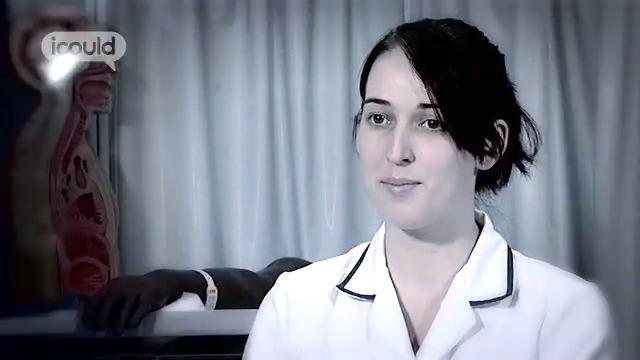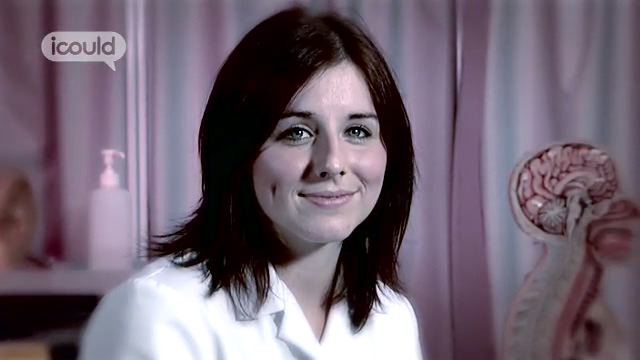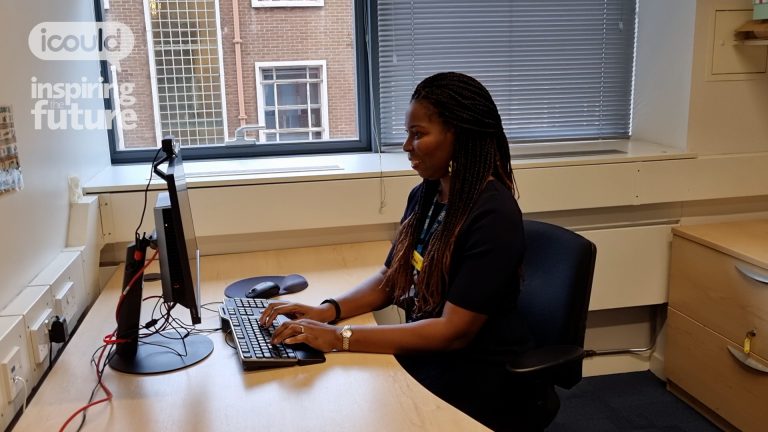Occupational Therapy Assistant
Addenbrookes Hospital
Sarah Hs
00:00:02 My name’s Sarah Hs and I’m an Occupational Therapy Assistant. I work in Neurosciences, and we tend to work with patients who have been in road traffic accidents or had brain tumours, and also people with spinal injuries come to us. We tend to use repetition as our most important tactic, and this will be going through photographs, teaching people as to where they are – time, place, person. In other ways we’ll also tell them to get to a certain ward at the hospital without your help and – this is even hard for me but – in such a big hospital! – but each patient learns in very different ways. Sometimes you have to almost teach people the things they learnt as a child, because they’ve gone so far back, through their injury, that they need to relearn their skills.
00:00:56 I find this job very rewarding, but also very challenging so it’s – you don’t – almost every morning you wake up, you don’t know what kind of day you’re going to have. It’s constantly changing, which is what was brilliant. You have to be very creative, you almost have to, you know, think on the spot.
00:01:17 As of two years ago, I never knew what Occupational Therapy was. As a – from a young child was always hooked on drama, was always going to be an actress, and took A-Levels in Drama, and then a degree in Drama. And it was through my Drama degree that I actually thought – d’you know what, it’s not for me. I then decided to join Addenbrookes staff bank for administrating duties around the Trust, and I worked in many different areas. By talking to the Health Visitors, they said ‘Well why haven’t you tried Occupational Therapy?’ And I said ‘Well I’ve never heard of it.’ And so I researched into it, and it’s got a lot of similar skills – transferable skills, if you like. So then I went for this job and thankfully got it, and haven’t looked back. And now the next step is my degree so that I can work my way up, and become a Therapist.
00:02:19 My career will now progress through taking a degree in Occupational Therapy, which I am starting next month. I’m taking the part time route while I’m – while I work – because I like to be in the environment I’m working with, as well as studying. 00:02;38 The high point for me in my career path has been certain patients who I’ve worked with for many, many months and seeing them progress, from coming in after their accident, and seeing them leave a totally different person. That’s invaluable – just feeling that you’ve had – not total influence on that change – but that you’ve played a part.
00:03:06 What motivates me in my job is knowing that I’m making a difference in people’s lives every day, and I don’t think there’s been one moment that I’ve woken up in the morning and thought – I don’t want to go to work today. I feel like I’m – like I’m really important to a lot of people here.
00:03:27 My Mum has been a nurse for many, many years, and still is so unbelievably passionate about her job, and if I can be as old as her – sorry Mum! – and enjoy my job still as much as she does, then that would make me have accomplished something really important.
00:03:50 ENDS
Hooked on drama from a young age, it was whilst studying it at university that Helen realised it was not the career for her. In trying other things, colleagues recommended occupational therapy; a very good move… ‘I don’t think there has been one moment that I have woken up in the morning and thought – I don’t want to go to work today. I feel like I am really important to a lot of people here.’
More information about Occupational therapists
The UK average salary is £29,813
There are 37.5 hours in the average working week
The UK workforce is 47% female and 53% male
Future employment
- Considers the physical, psychological and social needs of a patient that may result from illness, injury, congenital condition or lifestyle problems;
- Devises, designs, initiates and monitors carefully selected and graded treatments and activities as part of the assessment and intervention process;
- Liaises with a wide variety of other professionals in planning and reviewing ongoing treatments;
- Trains students and supervises the work of occupational therapy assistants;
- Makes home visits to clients, families and carers to organise support and rehabilitation and assist them to deal and cope with disability;
- Counsels clients in ways to promote a healthy lifestyle, prevention of illness and/or preparation for coping with increasing stages of illness;
- Maintains patient records, manages caseloads.







